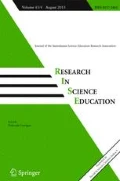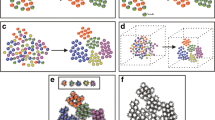The very conception of “belief” is itself an expression or construction from within the mundane idiom.... We learn to use “belief” in conditions when the “objective facts” are unknown or problematic and we want to indicate the tenuous character of our claim.... The notion of “real world” or “objective reality” is embedded in an extensive, pervasive language game which includes as an intelligible move or possibility the use of the very concept of “belief” itself. (Pollner, 1987, p. 21)
Abstract
We analyse and explore, in the form of dialogues and metalogues questions about the dialogic nature of beliefs and students belief talk about the nature of science and scientific knowledge. Following recent advances in discursive psychology, this study focuses not on students' claims but on the discursive resources and dialogical practices that support the particular claims they make. We argue that students' discourse is better understood as a textual bricolage that is sensitive to conversational context, common sense, interpretive repertoires, and textual resources available in the conversational situation. Our text is reflexive as it embodies the discursive construction of knowledge and undercuts any claims to authoritative knowledge.
Similar content being viewed by others
References
Aikenhead, G. S., Ryan, A. G. & Fleming, R. (1989).Views on science-technology-society. University of Saskatchewan: Department of Curriculum Studies, University of Saskatchewan.
Ashmore, M. (1989).The reflexive thesis: Wrighting sociology of scientific knowledge. Chicago: University of Chicago Press.
Bateson, G. (1980).Mind and nature: A necessary unity. Toronto: Bantam Books.
Bateson, G., & Bateson, M. C. (1987).Angels fear: Towards an epistemology of the sacred. Toronto: Bantam Books.
Churchland, P. M. (1989).A neurocomputational perspective: The nature of mind and the structure of science. Cambridge, MA: MIT Press.
Churchland, P. S., & Sejnowski, T. J. (1992).The computational brain. Cambridge, Mass: MIT.
Edwards, D., & Potter, J. (1992).Discursive psychology. London: Sage.
Feyerabend, P. K. (1991).Three dialogues on knowledge. Oxford, UK: Basil Blackwell.
Gilbert, G. N., & Mulkay, M. (1984).Opening Pandora's box: A sociological analysis of scientists' discourse. Cambridge: Cambridge University Press.
Goldstein, H. (1974).Klassische Mechanik [Classical mechanics]. Frankfurt: Akademische Verlagsgesellschaft.
Haraway, D. (1995). Situated knowledges: The science question in feminism and the privilege of partial perspective. In A. Feenberg, & A. Hannay (Eds.),The politics of knowledge (pp. 175–194). Bloomington: Indiana University Press.
Harding, S. (1996). Science is “Good to think with”.Social Text 46/47, 15–26.
Larochelle, M., & Désautels, J. (1992).Autour de l'idée de science: Itinéraires cognitifs d'étudiants et d'étudiantes [Around the idea of science: Students' cognitive trajectories]. Sainte-Foy: Les Presses de l'Université de Laval.
Lawson, A. E., & Weser, J. (1990). The rejection of nonscientific beliefs about life: Effects of instruction and reasoning skills.Journal of Research in Science Teaching, 27, 589–606.
Lawson, A. E., & Worsnop, W. A. (1992). Learning about evolution and rejecting a belief in special creation: Effects of reflective reasoning skill, prior knowledge, prior belief and religious commitment.Journal of Research in Science Teaching, 29, 143–166.
Lucas, K. B., & Roth, W.-M. (1996). The nature of scientific knowledge and student learning: Two longitudinal case studies.Research in Science Education, 26, 103–129.
Pinch, T., & Pinch, T. (1988). Reservations about reflexivity and new literary forms or Why let the devil have all the good tunes? In S. Woolgar (Ed.),Knowledge and reflexivity: New frontiers in the sociology of knowledge (pp. 178–197). London: Sage Publications.
Pollner, M. (1987).Mundane reason: Reality in everyday and sociological discourse. Cambridge, UK: Cambridge University Press.
Redfield, P. (1996). Beneath a modern sky: Space technology and its place on the ground.Science, Technology, & Human Values, 21, 251–274.
Roth, W.-M. (1995). Affordances of computers in teacher-student interactions: The case of Interactive Physics™.Journal of Research in Science Teaching, 32, 329–347.
Roth, W.-M., & Alexander, T. (1997). The interaction of students' scientific and religious discourses: Two case studies.International Journal of Science Education, 19, 125–146.
Roth, W.-M., & Lucas, K. B. (1997). From “truth” to “invented reality”: A discourse analysis of high school physics students' talk about scientific knowledge.Journal of Research in Science Teaching, 34, 145–179.
Roth, W.-M., & McGinn, M. K. (in press). >unDELETE science education: /lives/work/ voices.Journal of Research in Science Teaching, 35.
Roth, W.-M., McRobbie, C., Lucas, K. B., & Boutonné, S. (1997). Why do students fail to learn from demonstrations? A social practice perspective on learning in physics.Journal of Research in Science Teaching, 34, 509–533.
Traweek, S. (1996). Unity, dyads, triads, quads, and complexity: Cultural choreographies of science.Social Text, 46/47, 129–139.
Woolgar, S. (Ed.). (1988).Knowledge and reflexivity: New frontiers in the sociology of knowledge. London: Sage.
Author information
Authors and Affiliations
Corresponding author
Rights and permissions
About this article
Cite this article
Roth, WM., McRobbie, C.J. & Lucas, K.B. Four dialogues and metalogues about the nature of science. Research in Science Education 28, 107–118 (1998). https://doi.org/10.1007/BF02461645
Issue Date:
DOI: https://doi.org/10.1007/BF02461645




